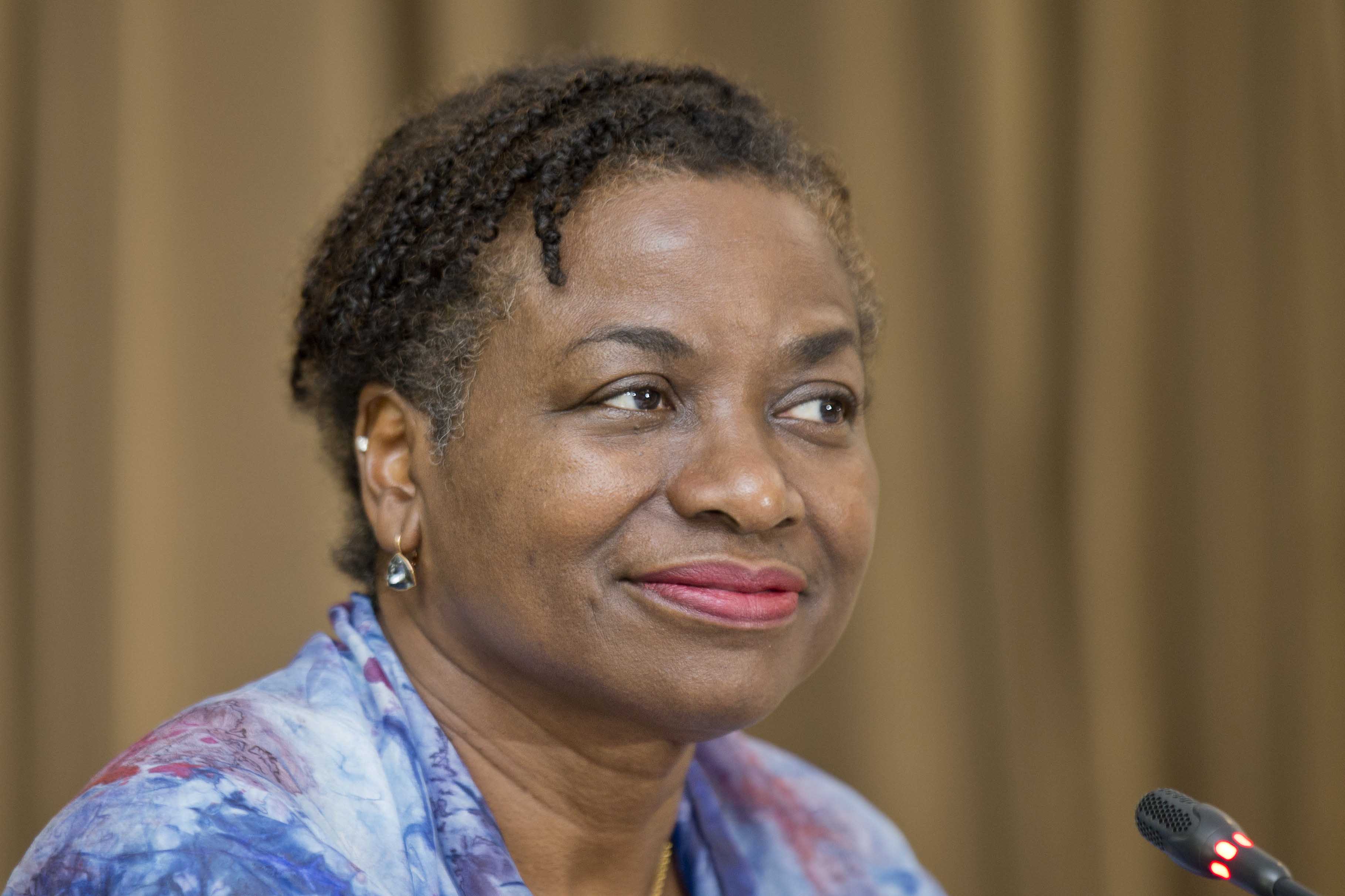
Under the administration of President Donald Trump, the U.S. has axed all federal funding — which previously amounted to roughly $70 million a year — for the UNFPA, exercising the executive branch’s ability to prevent foreign aid from going to organizations it deems of being involved in coercive abortions (accusations the UNFPA has steafastly denied).
“We really lament the posture of the current U.S. administration, which has had a devastating effect on our ability to deliver [aid], especially in humanitarian circumstances,” Kanem said in an interview for POLITICO’s Women Rule podcast. “In Yemen, we had 268 hospitals and clinics that were helping people. And that’s shrunk down by 100 because of the loss of the funding and the effects of the global gag rule.”
Kanem sees many barriers to the UNFPA’s goal of ending gender-based violence, maternal deaths and unmet family planning: war, natural disasters, deeply entrenched cultural ideas about women and gender, and a dawning embrace of populism and nationalism — and rejection of internationalism — throughout much of the world.
But, viewed from an even higher altitude, the world is in the middle of a “season of pushback, of people almost resenting the fact that women are going to take control of their own body,” Kanem said.
“Women have coalesced; women have marched; women have spoken out. Movements like the ‘Me Too’ movement have made it clear that we want full equality, not just embroidering around the edges, if you will. And I think, in a way, your success can lead to the attraction of counterpoint voices.”
In advance of International Women’s Day, Kanem joined Anna Palmer to record an episode of POLITICO’s Women Rule podcast. What follows are excerpts of their conversation, edited for length and readability. For more, listen to the interview on the newest episode of Women Rule.
Anna Palmer, POLITICO: You’ve been head of UNFPA since 2017, but you’ve certainly been working in public health for much longer than that. I’m curious how you think the conversation around reproductive health, bodily autonomy — how has that changed since you began in the field, or has it?
Dr. Natalia Kanem, UNFPA: As a young pediatrician and health researcher, I was very baby-focused, as was the field. Eventually, it dawns on you that that baby does not appear from the sky, that there is a lineage that really has an effect on the health — and I’m not even just talking about nutrition.
So, I’ve seen a lot of progress, but I’ve also seen cause to worry: Why is it so slow? What is there about an agenda of putting women and girls at the center that doesn’t come true literally overnight?
Palmer: Even today, when we talk about this topic, it’s kind of positioned as a “woman’s issue.” But so much of it is also a men’s issue. Why do you think the conversation hasn’t shifted there?
Kanem: There are women of courage who are calling the question everywhere. And you’re right: This is a societal issue. In this era, it’s not even a binary male-female issue; it’s an issue for everyone to pay attention to. Sexual and reproductive health is a big part of human identity.
“Who am I?” These are questions that young people the world over struggle with, and they deserve our support, and they deserve the ability to have a dialogue that is not lacquered with a lot of ideology and recrimination.
You know where this is most important? During times of crisis. UNFPA has distinguished ourselves by facilitating dialogue — we call them in “safe spaces” — even in the middle of a refugee camp. It gives the chance for dialogue to talk about what matters most to people. And sexual and reproductive health is actually one of the top priorities of a woman who is in crisis.
Palmer: I came across a speech you gave in December at the UN. You said that globally there is, “a rising regressive tide that threatens to tear away the rights that women and girls have over their bodies, their choices, and their lives, and that progress seems to be slowing all over the world.” Why do you think that’s happening now?
Kanem: The fact is, women have coalesced; women have marched; women have spoken out. Movements like the Me Too movement have made it clear that we want full equality, not just embroidering around the edges. And I think, in a way, your success can lead to the attraction of counterpoint voices.
Working in some of the countries where we do, the shame and stigma attached to being pregnant out of wedlock is still there. So let’s admit that, right? The fact is, we very often deny factual information to young people, and that girl is made more vulnerable because she literally does not know. She doesn’t know anything about the so-called facts of life, right? So, how tragic, then, if she falls pregnant. She’s blamed. She’s still forced to drop out of school. The cycle of poverty for her and her family is definitely going to continue.
In many instances, the harshest judgments are not from a place of compassion; they’re not from a place of trying to understand where she is. It’s actually a blaming of the victim. We want to empower that girl to understand that you are the owner of your body. You can scream if you feel threatened; you should not be led down the garden path through ignorance.
Palmer: You mentioned the ‘Me Too’ movement, and there’s a lot happening in the industrialized world. I wonder how that impacts your approach to work in poorer countries?
Kanem: The fact is, everywhere in the world, sexual and gender-based violence is wrong. Sexual and gender-based violence is hidden. And this toxic mixture of not being able to speak the truth about what’s happening to you not only disturbs [your] physical health, the consequences in terms of your self-respect that can be devastating across a lifetime.
So we can see [in prominent ‘Me Too’ cases] the people who may be wealthy; they may be famous; they may be lauded in their profession or their sphere, have been derailed by some of these circumstances. How much more vulnerable now, when there’s little you in some village somewhere, and you are being subjected to this type of attack on your human rights?
In the medical frame, we do a lot with survivors of rape. This is a crime of war that is increasing, very disturbing. And I’ve always been struck by one lady who said very clearly, “Doctor, it’s great that you’re here. Thank you for the social work support that UNFPA provides. Thank you for healing us when we’ve been wounded through these crimes.” She was actually talking about rape in conflict. This was in a Rohingya camp. But she said, “It’s the wound that you don’t see, that’s the one that cuts the deepest.”
Palmer: Later this year, it’ll be the 25th anniversary of the Beijing World Conference on Women, which is seen as a real turning point for women’s empowerment globally. Does it feel dispiriting to be dealing with some of the exact same issues now as you were then, or do you see just real progress at this point?
Kanem: Well, in my charitable moments, I think it’s a spiral and we’re on a higher rung of the spiral. And one of the things that’s really been invigorated is our understanding that every two seconds, a child is married around the world; 33,000 girls under the age of 18 every day. And this has knock-on consequences. So, this will be a moment for us to think about how do we protect the adolescent girl?
UN Women has elaborated a strategy that includes people in local communities having action plans together. And I think that these action coalitions are going to be really important to stop child marriage, to stop deaths in childbirth — 800 women a day around the world. This is something that we can join hands to do something about.
You know, it’s a time when, okay, there’s pushback, but pushing back against that pushback shows us our power. So, ultimately, I think women have said women are not going back, and to move forward we’ve got to be much more highly strategic.
Palmer: Looking forward, imagining 25 years from now, what are things you think we will have really changed since today on these issues? Is there something you hope that we’ll be talking about 25 years from now that we aren’t talking about now?
Kanem: We look at this through a 10-year lens, because we don’t want to wait 25 years to do something that really possibly should have been done yesterday. So, when I think about the 10-year-old girl of today stepping out as a 20-year-old, as a 35-year-old, she is going to have full rights to be a card-carrying equal member of society. She is going to be safe in her home. She is going to be safe in her community walking to school. She is going to have the opportunity to go to school. Education is fundamental for empowerment. And it is maddening that a girl can be kicked out of school for becoming pregnant when no one gave her the sexuality education that would have been preventive for her.
So, 10 to 20 years from now, I’m going to see that young women are being respected by the other people in society. I will see young men who will be standing up as defenders of a gender-equality agenda. And we will have an opportunity to, once and for all, deal with the notion that women can be coerced against their will into any type of harassment or sexual assault.
But above and beyond that, I think the understanding that human reproduction is part of an age-old process, which has its own sacredness, and that women should be respected for this, and entrusted with decisions that they are perfectly capable of making, that will accrue not only to their benefit, but to those coming around them. It’s not going to be that hard to talk about that, 10, 20 years from now.
To hear more from Natalia Kanem, listen to the full podcast here. Women Rule takes listeners backstage with female bosses for real talk on how they made it and what advice they have for women looking to lead.
Source: politico.com
See more here: news365.stream





